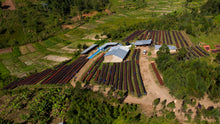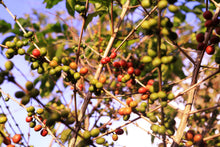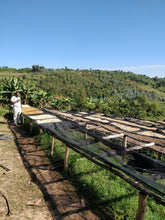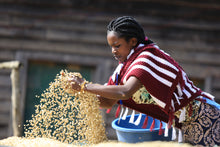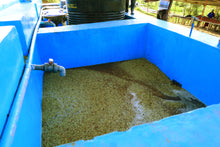Rwanda - Fugi Ikizere
- Regular price
- $21.00
- Sale price
- $21.00 Sale
Tasting guide:
Pear - Lemonade - Citrus Zest
______________________________________________________________
Origin: Bushekeri Sector, Nyamasheke District, Western Province, Rwanda
Farmers: 61 Female Smallholders
Washing Station: Fugi
Altitude: 1550 - 1850 MASL
Varieties: Red Bourbon
Process: Washed
Drying Method: Raised Beds
Drying Time: 50-53 Days
______________________________________________________________
In the words of Semilla Coffee:
"About Fugi Washing Station:
Fugi has long been a favourite of ours in the Baho network, producing consistently excellent washed and natural lots. Located in the Southern Province of Rwanda, it is nestled between the Nyungwe National Forest and the border of Burundi. It’s the second smallest station in the Baho collection, purchasing cherry from approximately 950 smallholder farmers in total. This washing station produces approximately 900 bags of exportable specialty grade coffee each year. Fugi was built in 2013, but it was purchased by Emmanuel in 2016. Since then, he’s dedicated this station to solely producing specialty grade coffee. Together with Bugoyi, Fugi is a key part of the foundation upon which he launched Baho Coffee operations. On average, producers bringing coffee to Fugi manage around 600 trees, with a median cherry yield per tree of 3kg - this equals about one and a half exportable bags of green coffee per producer. This figure perfectly exemplifies just how small the average producer is in Rwanda, and it gives some context as to why they are selling to washing stations rather than developing their own costly wet and dry mills. Fugi employs 70 people at the peak of the season - there are rotating seasonal/part time workers in addition to a core staff. As part of standard Baho practice, the pension for all workers is paid for them on top of their wages.
Processing at Fugi Washing Station:
The initial steps for each process are the same: First, a day of intensive sorting at the cherry. stage, under complete shade, to ensure only the ripest are chosen and any visible defects are removed. Step two is multiple rounds of floating - filling a large container with cherries and water, discarding the less dense cherries that float to the top of the tank. The densest coffees (sinkers) are reserved to be processed as the higher grade lots, and the less dense coffees (floaters) are mixed in with the rejected cherries from the initial sorting to be processed as lower grade lots. It’s expected that cherries are delivered to stations, on average, between 2 to 3 hours from picking.
When enough volume has accumulated, the cherries are depulped and the double fermentation process is started. First, a dry fermentation for 8 to 12 hours. The tank is then filled with water for an additional 8 to 12 hour wet fermentation. Once the fermentation process is complete, coffee is pushed through the grading channels. Here the coffee is very rigorously washed to remove any remaining mucilage and separated by density. After grading, the coffees are soaked (now with no mucilage attached) in a tank of water for a final 8 to 12 hours. This is thought to promote even distribution of moisture throughout the seeds, thus leading to more even drying. Coffee is then moved onto shaded drying beds for 48 - 72 hours. This step has two distinct benefits. First, it sets the trajectory for the entire drying phase by initially beginning very gently
and slowly under complete shade. Secondly, it allows ample time for intensive sorting while the parchment is still wet - this is important because certain defects (seeds bitten by Antestia in particular, thought to cause the potato defect) can be seen much more easily when the parchment is wet. During the first 5 days on the tables, parchment is only exposed to sunlight for a maximum of 3 hours per day, and it is manually turned every 30 minutes to avoid cracking from overly fast drying. It’s finally moved onto drying beds in full sun and turned 4 times per day. Temperature is closely monitored throughout the day - if it exceeds certain thresholds, workers will focus on
turning coffee more frequently or cover the beds with mesh netting. When the moisture content reaches 11.0%, the drying phase is considered complete. The parchment is bagged and stored in a dry warehouse until time for milling. Total drying times for washed process coffee is around 30 - 40 days."








